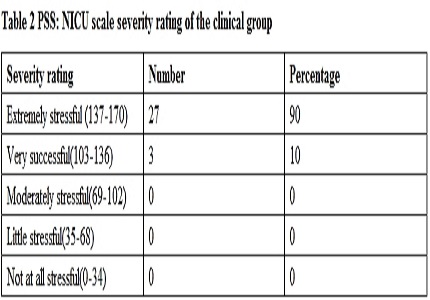Psychological distress in mothers of infants admitted in neonatal intensive care unit (NICU)
Abstract
Introduction: Mothers whose infants are admitted to NICU undergo significant distress which can interfere with mother infant bonding.
Materials & Methods: Mothers belonging to two groups: Group 1 –(clinical) 30 mothers of infants admitted in NICU of IGICH. Group 2-(control) 30 mothers of normal infants from Jayanagar General Hospital (JGH) were included.
Period Of Study: July 14 to Dec 14. All mothers cooperative for interview, mothers from intact families were included. Mothers of infants having major illness were excluded.
Results: Qualitative analysis of clinical sample indicates 90% mothers in “extremely stressful” severity rating and 10% “very stressful” rating. Urban families experience more stress (p=0.012). Previous NICU experience showed higher stress levels as compared to no previous experience (p=0.052). Coping styles like praying to god about infant well being(100%), reading books(26%), always thinking about baby(100%), expressing emotions to husband and families (85%), blaming themselves(56%) and others like in laws(10%), meditating(12%), keeping feelings and emotions to themselves (43%), sitting and crying(10%). Control group used praying and talking to themselves (43%), sitting and crying (10%). Control group used praying and talking to family and coped better. Statistically significant difference indicating higher distress in mothers of clinical group.100% felt bad, lonely, hurt and sad, 50% felt hopeless about future and 25% expressed anger mostly directed towards their mother/husband. 70% mothers in clinical group were not allowed to breastfeed thus causing emotional distress to the mother.
Conclusion: Mothers are at immense stress when separated from their infants hence measures to reduce the same must be considered.
Downloads
References
2. Siegel, R., Gardner, S.L, &Merenstein, G.B. Families in crisis: Theoretical and practical considerations. In: Merenstein, G.B. & Gardner, S.L. .Handbook of Neonatal Intensive Care. London: Mosby Yearbook.1993;431-432.
3. Miles MS, Funk SG, Carlson J. Parental Stressor Scale: neonatal intensive care unit. Nurs Res. 1993 May-Jun;42(3):148-52. [PubMed]
4. Goldberg DP, Hillier VF. A scaled version of the General Health Questionnaire. Psychol Med. 1979 Feb;9(1):139-45. [PubMed]
5. Blumberg NL. Effects of neonatal risk, maternal attitude, and cognitive style on early postpartum adjustment. J Abnorm Psychol. 1980 Apr;89(2):139-50. [PubMed]
6. Miles, M. Assessing parental stress in intensive care units. American journal of maternal and child nursing. 1983;8:345-359.
7. Singer LT, Salvator A, Guo S, Collin M, Lilien L, Baley J. Maternal psychological distress and parenting stress after the birth of a very low-birth-weight infant. JAMA. 1999 Mar 3;281(9):799-805.
8. Padden, T., and Glenn, S. Maternal experience of preterm birth and neonatal intensive care. Journal of reproductive and infant psychology.1997;15:121-139. [PubMed]
9. Holditch-Davis D, Bartlett TR, Blickman AL, Miles MS. Posttraumatic stress symptoms in mothers of premature infants. J Obstet Gynecol Neonatal Nurs. 2003 Mar-Apr;32(2):161-71. [PubMed]
10. Shainess N. The Psychologic Experience of Labor. N Y State J Med. 1963 Oct 15;63:2923-32. [PubMed]
11. Field TM, Schanberg SM, Scafidi F, Bauer CR, Vega-Lahr N, Garcia R, Nystrom J, Kuhn CM. Tactile/kinesthetic stimulation effects on preterm neonates. Pediatrics. 1986 May;77(5):654-8.

Copyright (c) 2015 Author (s). Published by Siddharth Health Research and Social Welfare Society

This work is licensed under a Creative Commons Attribution 4.0 International License.


 OAI - Open Archives Initiative
OAI - Open Archives Initiative


